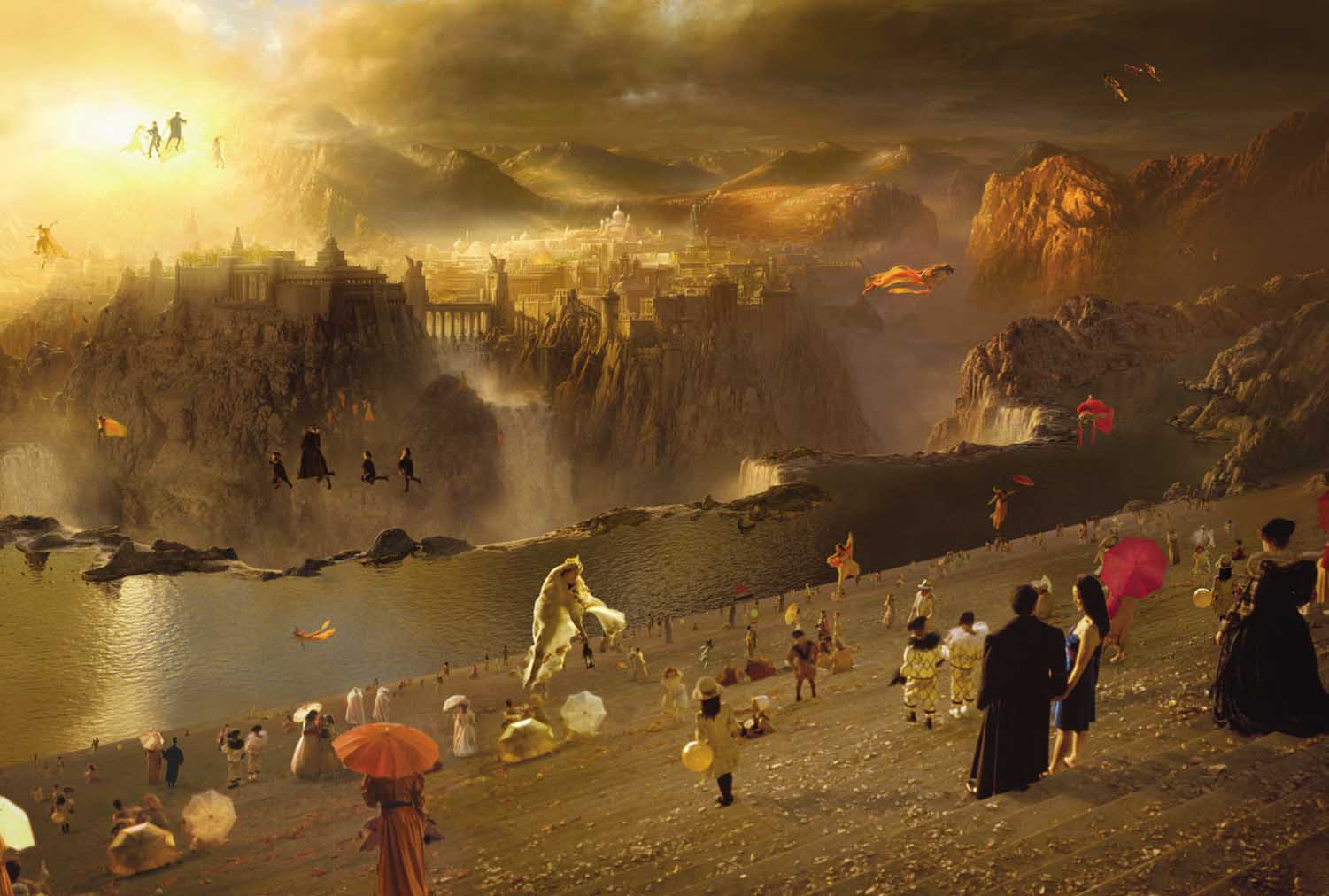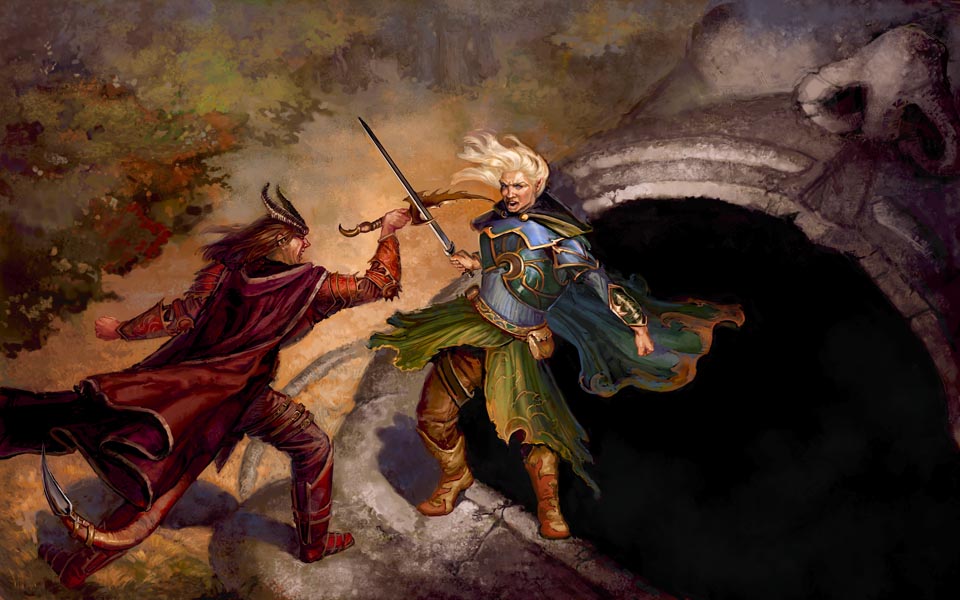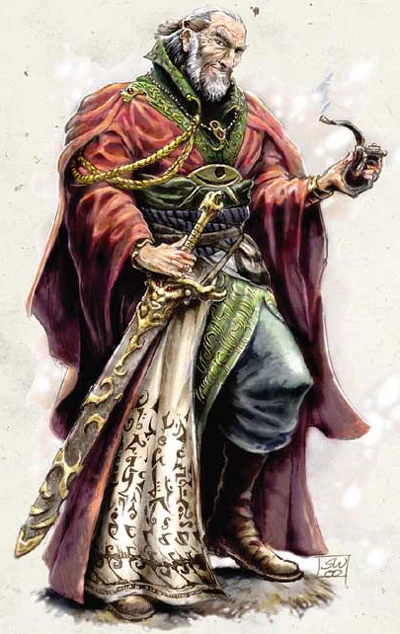I generally don't like doing opinion pieces, but this one is something I've thought about for awhile. And it's less of a "my opinion is right!" and more of a "here is me presenting a different perspective on an issue".
Death in RPGs is a bit of a touchy subject among players and game masters. Some people prefer more lethal games, where survival is key and death is final or severely limited. Opponents to this become unattached to their characters, since they are just going to die anyways. Other people prefer their characters to be big damn heroes, with raise dead being more available to keep their favorite characters in the story. Opponents to this say that this lowers the difficulty of the game and that feeling of persevering in the face of danger is lessened, since you'll always succeed eventually. There are, of course, all kinds of middle ground, but the key arguments are a) does death and lethality add or take away from the game and b) does resurrection add or take away from the game.
To understand this, we need to discuss the true cost of death. On first thought, many will look at the monetary cost that you'd see in Pathfinder and D&D 3X. Death is money plus the corpse and you are good to go. Many people don't like this because they feel it makes the game too forgiving and challenges less dangerous. Others see the world building issues of kings and villains that never die because of raise dead and resurrection. But this isn't what I consider the true cost of death.
In some retro clones and other RPGs, XP and levels are the cost of death. You lose XP or some type of advancement when you are raised back to life. Some people do not like this because it feels like punishing the player for some things out of their control, like bad dice rolls or GM mistakes. Other games, like 13th Age or ACKS, allow the players to raise the dead, but it is usually very rare, requires a quest, or there is always a catch or something bad that will happen. Opponents don't like this because of the punishing aspect and feel that if one wants to discourage raise dead like that, they should simply not have it as an option. I remember reading an article about this some time ago, but I forget where. But neither of these are really what I feel is the true cost of death in RPGs.
What is the true cost of death in RPGs?
What is the true cost of death in RPGs?
When you really think about it, once a character dies, that player can no longer participate in the game. They have to sit out until their character is resurrected or they bring in a new character. Both have their downfalls. I personally like more lethal games, so resurrection does make it feel like a game has more forgiving consequences. And bringing in a new character can be difficult. You have to try and think of a way to explain a complete stranger coming into your group that's roughly the same level as you. Depending on the game and how far into it you are, writing up a new character can take some time. This is especially true of games in Pathfinder or other more crunch games.
Alternatively, you could play as a hireling or NPC ally now, but that's not really your character. That's just a character the GM made and I feel there is less of an attachment to that in some causes, unless that hireling has made a good impression on the party. Still, I'd prefer to play a character I make. Starting all the way back at level one can be very lame, since now you have to play catch up and hope your character doesn't get killed by the higher level dangers your team is facing. Whether you use the Challenge Rating system or just throw caution to the wind with balanced combats, eventually your players will be taking down bigger and bigger foes that will cream your new character. On the other hand, bringing in Bob 2.0 at the same level is a cop out, since they didn't earn those levels like the rest of the team did. And how many level 17 wizards are roaming the world to fill in some shoes, eh?
Alternatively, you could play as a hireling or NPC ally now, but that's not really your character. That's just a character the GM made and I feel there is less of an attachment to that in some causes, unless that hireling has made a good impression on the party. Still, I'd prefer to play a character I make. Starting all the way back at level one can be very lame, since now you have to play catch up and hope your character doesn't get killed by the higher level dangers your team is facing. Whether you use the Challenge Rating system or just throw caution to the wind with balanced combats, eventually your players will be taking down bigger and bigger foes that will cream your new character. On the other hand, bringing in Bob 2.0 at the same level is a cop out, since they didn't earn those levels like the rest of the team did. And how many level 17 wizards are roaming the world to fill in some shoes, eh?
So now as a player, you basically have to not play the game while everyone around you scrambles to get you back to life, or get to an area where it would 'make sense' to bring in your character. Watching everyone play without participating is really the big cost to character death and it can be lame. We all have busy lives and try to meet up to escape that, play some games, drink some beer, and have some laughs while we pretend to be elves and dwarfs. So getting left out of that kind of sucks.
So what do we do?
Removing death wouldn't work. Death and other consequences are great in the game as they add real depth to player choices and make them real. Real danger and consequences make decision making matter more. And there is always adventure to happen in failure.
Luckily there are a great deal of ways I feel we can work around this without removing death. Having the players play a company of people is a great way to have many party members on tap for players to play as. Simply have each player make multiple characters and you can have them fill in when your character dies. Now you have a character that you are invested in and can continue playing. This works best with less crunchy games, since it is easy to build characters, but I'd give it a try in anything. And since they've been adventuring with you, they will at least be a higher level than one, so you aren't too far behind your teammates.
 |
| Christ I love Berserk |
Also, you can have the dead player continue to affect the situation. Perhaps they can play as the monsters now with the GM, taking on a bit more of an adversarial role against their former comrades. I actually genuinely like this route because it not only keeps them in the game, but adds an interesting adversarial twist to the session. Alternatively, you can have the player act as a ghost of their PC, still capable of limited actions and helping until the players can raise them (or until they send them off to the afterlife with a proper burial and get a new character in). I think that would be interesting, as it takes the quest for resurrection but still keeps that player involved and playing. There could also be a Dark Souls take on the game, where when die, you come back but more corrupted or Hollow, until you finally lose yourself and attack your allies. Add in some Bloodborne monster transformations and you have a cool boss fight on your hands with your dying PC verses the others trying to bring them peace in death. With swords, of course.
One can also have a little afterlife adventure, where the player or players that died have to adventure back into the land of the living. The other players can play as otherworldly allies that want to see them make it back, or play as tricksters wanting to claim their soul, or play as psychopomps trying to get them to be judged. There are all kinds of weird, metaphysical adventuring you could have here, from a classic game against the Grim Reaper to a cool, Day of the Dead themed party with La Catrina to a legitimate journey akin to What Dreams May Come. This would be great for one or two dead players, or an entire TPK'd party. While it does lessen the penalty of death somewhat, it increases the impact of death that will last with the players and creates an amazing adventure that will be remembered for sessions to come.
There are still many options I haven't even thought up of yet that one could use, and each one could fit our varied play styles. I like more lethal, survival games, but I also like a heavy dose of supernatural and occult themes, so the adventuring in the afterlife would be great for me. Whatever the choice, as long as we keep our players engaged and playing and ultimately having fun, then I think we are doing a good job as GMs.
And I'm really wanting to run something akin to Ghostwalk from 3.5 now. I think I'll definitely revisit this topic with some further ideas that are more fleshed out.
 |
| by Elena Bespalova |
 |
| Adventure in the Afterlife! |
And I'm really wanting to run something akin to Ghostwalk from 3.5 now. I think I'll definitely revisit this topic with some further ideas that are more fleshed out.



No comments:
Post a Comment